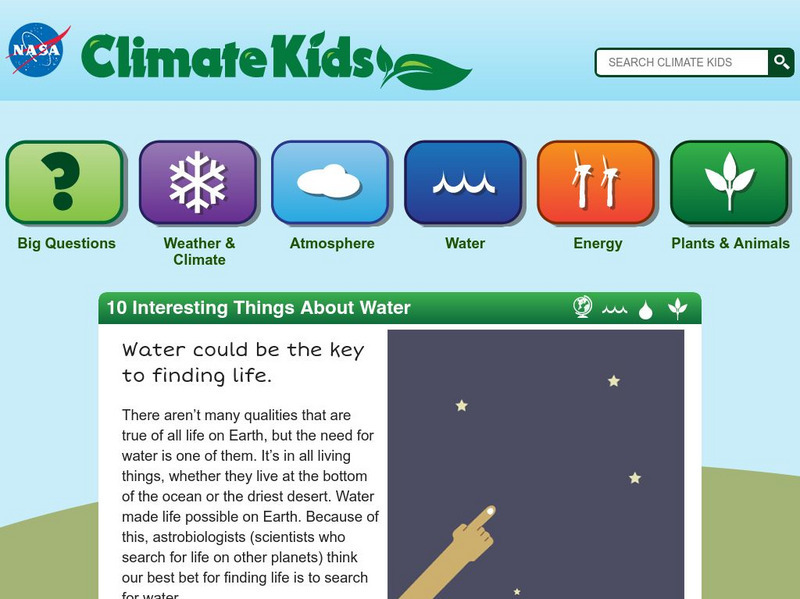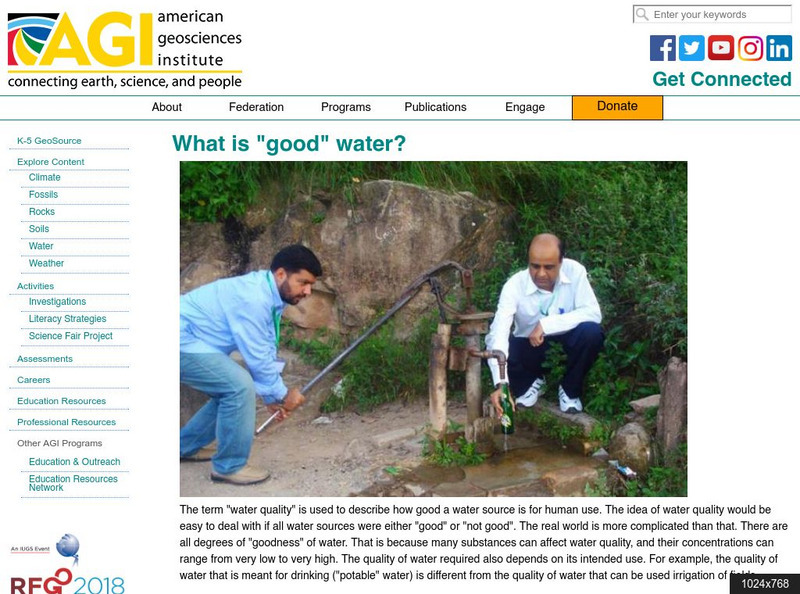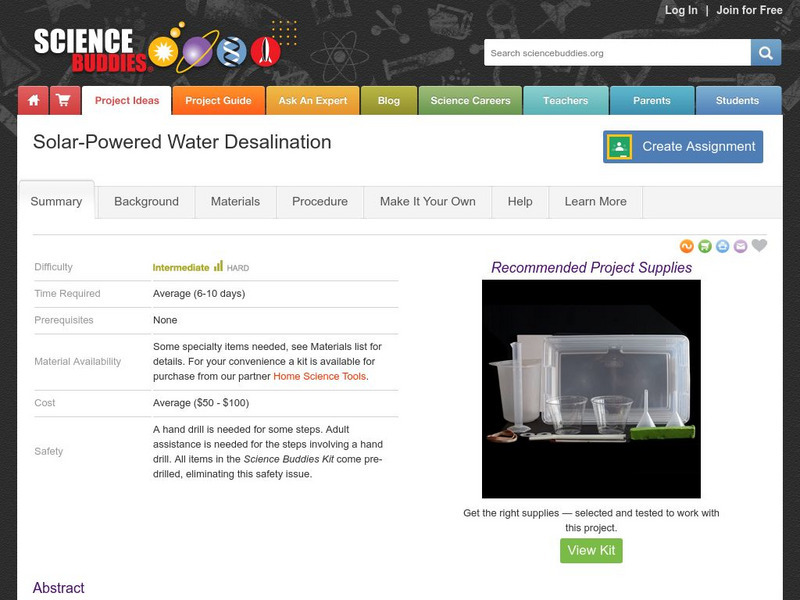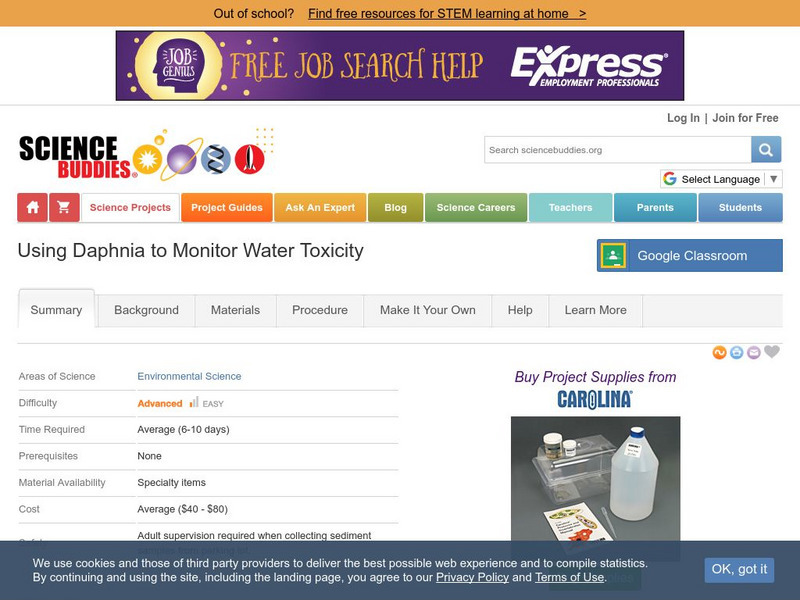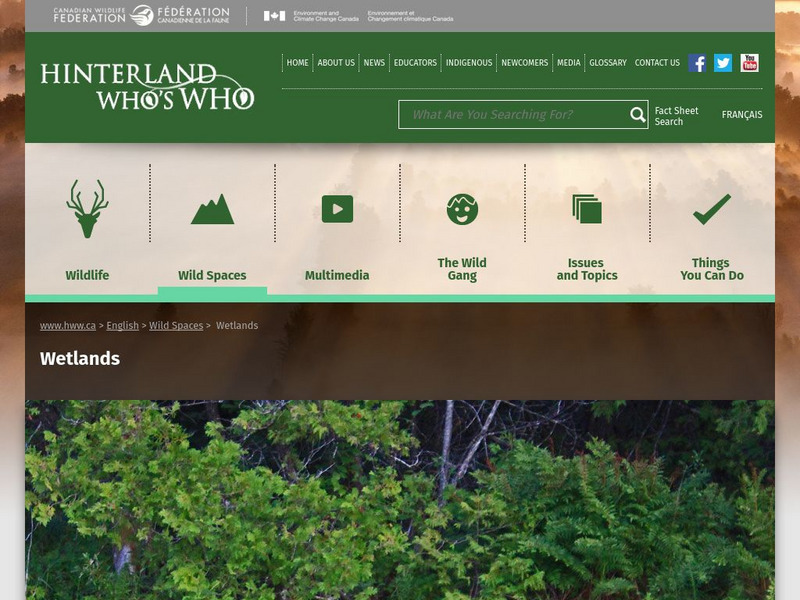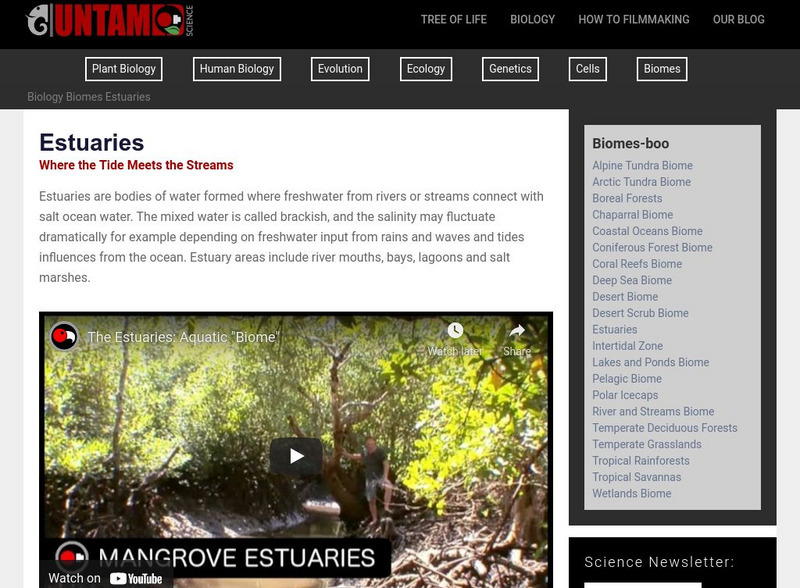Unique Australian Animals
Unique Australian Animals: Yabby
The Yabby is an Australian freshwater crayfish. Read the description at this website to learn more.
Ducksters
Ducksters: Brook Trout for Kids
Kids learn about the brook trout. What it looks like and eats. Where do they live in fresh water?
BiologyWise
Biology Wise: Facts About Daphnia (Water Fleas)
Describes the physical characteristics of Daphnia, their importance as a food source for freshwater fish, their diet, life cycle, and methods of reproduction. Offers tips for how to start and maintain a colony of Daphnia that can be used...
Other
Gillett's Jewellers: Pearl Information
Pearl characteristics, differences between a cultured pearl and a shell-based pearl, and freshwater pearls are some of the topics featured on this page.
NASA
Climate Kids: 10 Interesting Things About Water
Discover 10 very interesting things about water, including sources of life, ocean ecosystems, freshwater and ice, salt and salt water, sources of water, the body's water makeup, plant's consumption of water and the 3 states of water.
HotChalk
Hot Chalk: Lesson Plans Page: Aquatic Wildlife and Pollution
This lesson plan is designed to teach young children about healthy and hazardous marine and freshwater environments and be able to describe the effects of the pollution of plastics on wildlife.
abcteach
Abcteach: Ponds
[Free Registration/Login Required] The abcteach directory contains sample pages from their pond unit for non-members. Handouts are in PDF format.
Other
Adopt a Pond Wetland Curriculum Resource
The Adopt-A-Pond Program was created by the Toronto Zoo for teachers looking for a guide to wetland issues and resources.
American Geosciences Institute
American Geosciences Institute: What Is Good Water?
Learn about the term water quality, and how it is used to describe water sources for human use.
American Chemical Society
Inquiry in Action: Changing the Density of a Liquid: Adding Salt
In this activity, students will see that a carrot slice sinks in fresh water and floats in saltwater. Considering the placement of the carrot slice in water and salt water, students will infer that the density of salt water must be...
Idaho State University
Idaho State University: Water Pollution
Explore water pollution in surface water and groundwater and investigate the treatments for both. Also, check out what happens when salt water infiltrates the fresh water sources.
PBS
Pbs Learning Media: Scent of an Alewife
This video segment from NOVA: "Sea Behind the Dunes" tracks the return of spawning alewife fish from the open ocean back to the freshwater streams and ponds where they were born. [3:34]
Science Buddies
Science Buddies: Solar Powered Water Desalination
Here is a cool project about making fresh water from salt water using solar power, also known as water desalination. The apparatus is made from readily available materials, and the power source is free. As an inventive thinker, you will...
Science Buddies
Science Buddies: Using Daphnia to Monitor Water Toxicity
In a bioassay, a living organism serves as a detector for toxins-the same way canaries were used in coal mines to detect invisible toxic gases. In this project, water fleas (Daphnia magna), a freshwater crustacean, are used in a bioassay...
Science Buddies
Science Buddies: Caffeine and Heart Rate: A Pharmacological Study Using Daphnia
In this project, water fleas (Daphnia magna), a semi-transparent freshwater crustacean, are used to study the effects of caffeine on heart rate. You do not have to learn how to take a crustacean's pulse though, because you can actually...
Canadian Wildlife Federation
Hinterland Who's Who: Wetlands
Learn about Canada?s wetlands, what they are and where they are located. Wetlands are divided into two classes: freshwater and saltwater. They are further separated into four main types: ponds, marshes, swamps, and peatbogs. Discover the...
Canadian Wildlife Federation
Hinterland Who's Who: Estuaries
Learn about estuaries, where the fresh water rivers meet the salt water of the oceans. The unique features of estuaries are explained, followed by a look into estuarine food webs. Next find out about the different plants and animals that...
Climate Literacy
Clean: Effects of Increased Co2 in the Air on Seawater and Distilled Water
Students perform an experiment comparing the impacts of CO2 on salt water and on fresh water. In a short demonstration, students examine how distilled water and seawater are affected differently by increasing carbon dioxide in the air.
Other
Project Wet: Discover Water
Interactive opportunities which emphasize the impact water has on our lives. Explore watersheds, ocean water, fresh water sources, and ways to use water responsibly by engaging in activities, coloring pages, and short quizzes.
Other
Florida's Springs: Protecting Nature's Gems
Explore Florida's springs, some of the world's largest freshwater springs. Here is a well-done site that includes information about threats to these unique springs, natural and cultural history, Florida wildlife, underwater cave systems,...
Other
Water Resources Programme: Chemistry of Carbonic Acid in Water [Pdf]
A detailed look at carbon isotopic composition isotope and carbonic acid in water. Sections include: "Carbonic Acid Equilibria," "Carbonic Acid Concentrations," and "Closed System, Mixing of Freshwater and Seawater."
Other
Alberta Riparian Habitat Management Society: What Is Riparian?
Learn what riparian areas are, why they are important for the health of standing and moving fresh water, how to assess their health, and how to take care of them.
Untamed Science
Untamed Science: Biology: World Biomes: Estuaries Biome
Make learning about Earth's biomes fun and easy with video clips, photographs, and diagrams. Learn about estuaries, the water environments formed where freshwater from rivers or streams mix salt ocean water. [6:38]
Science Education Resource Center at Carleton College
Serc: Lab 2: Anatomy of Coral
A lab experiment in a series of experiments that investigates coral. In this activity, students will use a microscope to examine the feeding behavior of a hydra, a fresh-water relative of coral. They will also observe the characteristic...
Other popular searches
- Freshwater Fish
- Freshwater Ecosystems
- Fresh Water Pollution
- Freshwater Organisms
- Fresh Water Salt Water
- Freshwater and Saltwater
- Fresh Water Sources
- Fresh Water Ecosystems
- Freshwater Wetlands
- Fresh Water Biomes
- Boiling Point Fresh Water
- Freshwater Habitats





